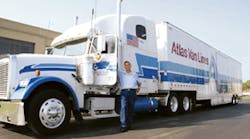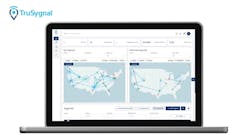Atlas Van Lines is working to be a technology leader in the household goods industry by making all of its transactions electronic. As one part of its eight-year campaign to go paperless by the spring of 2007, the carrier plans to start rolling out its paperless system at the inventory level, the carrier said. That system is now under the testing phase.
“We’ll start [by] having our drivers electronically check in and out of warehousing,” said Greg Hoover, senior vp & chief marketing officer told FleetOwner. “We’re looking at using a Palm-type of device to complete inventory. The driver would input inventory numbers. This would be a point-and-click as they select the item from a predetermined list. Right now, when these guys load the van there’s the old-fashioned inventory tape that they put on the box. In the new system the boxes would be bar-coded.”
That system would squeeze out human error, Hoover explained. “A lot of these guys don’t have the best handwriting in the world. This would be a far more legible, far more efficient process.”
Hoover said that he expects to see a return-on-investment within “a year or two.”
The next phase of the paperless campaign will be out in the field, where drivers will be equipped with portable computers that carry electronic forms. This step is “probably a couple years down the road.”
“We’re looking into equipping our drivers with virtual notebooks from which they’d fill out electronic forms….[capture] signatures, and then send it as a file to our database,” Hoover said.
The screen on the handheld computer would look like a paper form. Ultimately, the goal will be to reduce damage claims and loss, Hoover said.
Hoover said about 90% of its driver population are owner-operators. Atlas is considering ways to pass on some of the cost savings from less shrink and fewer claims on to drivers to provide them with incentives for adopting the paperless system.
Hoover points out that the use of new technology is already increasing among Atlas drivers, with 47% using laptops on the road this year, compared to 20% in 2005.
“Our long-range thinking is that if half our drivers are on laptops, we’ll want to develop our systems to the point where drivers with a laptop will be able to take full advantage of how they can do business,” Hoover said.
So far, Atlas has not adapted its processes specifically for drivers with laptops, but he said drivers are naturally adopting laptops as a way to both keep touch with family and friends, as well as do business.
“For our drivers, there has been more productivity in conducting business that way,” Hoover said. “Similar to the average person, first and foremost they use laptops for email, whether to stay in touch with family and home or to contact customers for pickup and delivery. They’re able to upload and download paperwork with shipment information. Email has been a natural way to communicate whether it’s business or personal.”
To comment on this article, write to Terrence Nguyen at [email protected]


